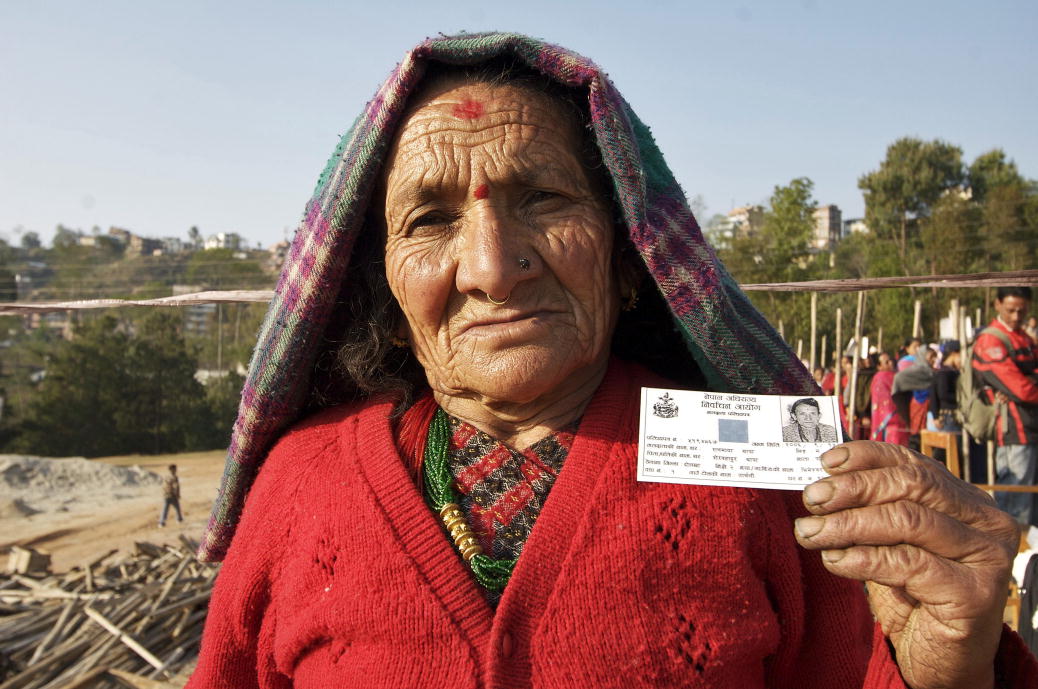Nepal Politics
A change of guard

80-year-old Ratna Maya Thapa from the Central Region of Nepal shows her voter registration card after walking for one and a half hours to cast her ballot in the Nepalese Constituent Assembly elections. 10/Apr/2008. Dolakha, Nepal. UN Photo/Nayan Tara.
© By - UN Photo/ Nayan Tara. (CC BY-NC-ND 2.0)The second round of general elections held on November 20 under the new federal republic system has given us a number of reasons to feel hopeful, the most important being the reassertion of people’s trust in democracy. It is with these incremental steps of holding one general election at a time that the people will eventually see a democracy mature in time. At present, the preliminary vote count seems to put the ball in the court of newer and younger leaders. A number of key decisions will have to be made by such leaders within mainstream parties and those under the banner of the Rastriya Swatantra Party, as well as by independent candidates.
As of the first half of November 22, these new candidates seem to be faring well; in terms of preliminary vote counts, the new Rastriya Swatantra Party appears to have garnered the fourth largest share, ahead of many mainstream parties. Independent candidates have also been garnering a significant number of votes. One message rings out loud and clear in this turn of events: the people are frustrated and are done with the old guard.
Another takeaway from the preliminary counts is that no party is currently likely to secure a majority. From a South Asian perspective, this is probably a good thing, as the region has seen that coalitions work better. Coalitions mean that policies will not be skewed towards any specific extreme ideologies. Balanced policies that emanate from such coalitions have historically coincided with periods of higher economic growth. This is good for Nepal, given that the elusive quest for economic growth lead to a series of political revolutions in the past.
Of course, such a course correction appears easier than it truly is; this is where the next move by the new leaders will be crucial. With a coalition looking inevitable, the new party has two choices. It could join the CPN UML and ride the latter’s wave, cementing its position in Nepali politics, but this is a move unlikely to bring a major change in the top leadership. The other option is joining hands with the Nepali Congress and helping its young leaders that seek to initiate major institutional reforms from within. This latter move has a greater potential of ushering major institutional reforms into the political parties of Nepal. This will enable the transfer of leadership within mainstream parties.
Regardless of the path, the new party takes (assuming that it will continue to maintain its current position until the final results are out), current developments hint towards a new and welcome change in the government to be formed: better representation of the youth. Greater youth representation will help realize the aspirations of the new generation. Nepal is constituted of a young population and will stay so for merely a decade and a half. Therefore, time is of the essence if we are to have a chance of harnessing the demographic dividend. With conscientious decisions from the new leaders, we could capitalize on this opportunity.
In all this, there is the hope that the leadership that assembles in the coming days will pay due regard to the economic aspirations of the common people. This means focusing on an extensive number of reforms: reforms that ensure people can earn their own living whilst paving a path to prosperity. Failure to deliver on these will result in a turbulent decade for Nepal: when we emerge from the next revolution, we will have lost the chance of harnessing the demographic dividend.
The message thus is clear: Change the old guard, and shift gears!
